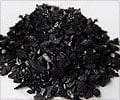A Michigan Technological University researcher has found that the grave carbon emissions of jet fuel can be reduced by about 84 per cent by refining it from the seeds of a lowly weed, which is a cousin to the cabbage.
David Shonnard, Robbins Chair Professor of Chemical Engineering, came to this conclusion after analysing the carbon dioxide emissions of jet fuel made from camelina oil over the course of its life cycle, from planting to tailpipe."Camelina jet fuel exhibits one of the largest greenhouse gas emission reductions of any agricultural feedstock-derived biofuel I've ever seen. This is the result of the unique attributes of the crop-its low fertilizer requirements, high oil yield, and the availability of its coproducts, such as meal and biomass, for other uses," he said.
Originated in Europe, Camelina sativa is a member of the mustard family, along with broccoli, cabbage and canola.
Also known as false flax or gold-of-pleasure, it thrives in the semi-arid conditions of the Northern Plains. The camelina used for the research was grown in Montana.
Shonnard points out that it is possible to convert oil from camelina to a hydrocarbon green jet fuel that meets or exceeds all petroleum jet fuel specifications.
According to the researcher, the fuel is a "drop-in" replacement that is compatible with the existing fuel infrastructure, from storage and transportation to aircraft fleet technology.
Advertisement
Given that camelina needs little water or nitrogen to flourish, Shonnard says that it can be grown on marginal agricultural lands.
Advertisement
Shonnard conducted the life cycle analysis for UOP LLC, of Des Plaines, Ill., a subsidiary of Honeywell and a provider of oil refining technology.
When asked whether people will soon be flying in plant-powered aircraft, Tom Kalnes, a senior development associate for UOP in its renewable energy and chemicals research group, said: "It depends."
Kalnes added: "There are a few critical issues. The most critical is the price and availability of commercial-scale quantities of second generation feedstocks."
He further said that more farmers would be require to be convinced to grow a new crop, and refiners must want to process it.
"But if it can create jobs and income opportunities in rural areas, that would be wonderful," he said.
Source-ANI
TAN











